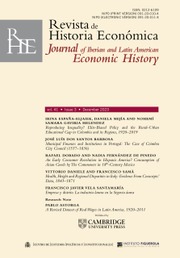Article contents
An Account of the Portuguese African Empire, 1885–1975*
Published online by Cambridge University Press: 28 April 2010
Extract
From the independence of Brazil in 1822 down to the independence of the African colonies in 1975, successive Portuguese governments became engaged in maintaining, enlarging, developing and, ultimately, in defending an empire in Africa. The literature on the Portuguese African empire is largely concerned with discussing the economic and political motives behind imperial policy1. Thus, the evaluation of the costs and benefits of the empire for the metropolitan economy —or, for that matter, the colonial economies— has not received much attention. This paper attempts to provide some of the evidence necessary to conduct such an evaluation2.
- Type
- Articles-Artículos: Part 3. The Second Epoch: Liberal Imperialism and Decolonization, 1846–1974
- Information
- Revista de Historia Economica - Journal of Iberian and Latin American Economic History , Volume 16 , Issue 1: The costs and benefits of european imperialism from the conquest of Ceuta, 1415, to the treaty of Lusaka, 1974. Twelfth International Economic History Congress. Madrid 1998 , March 1998 , pp. 235 - 263
- Copyright
- Copyright © Instituto Figuerola de Historia y Ciencias Sociales, Universidad Carlos III de Madrid 1998
References
BIBLIOGRAPHY
- 10
- Cited by




